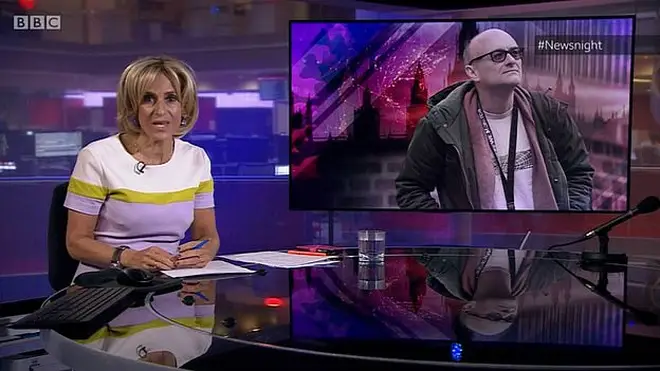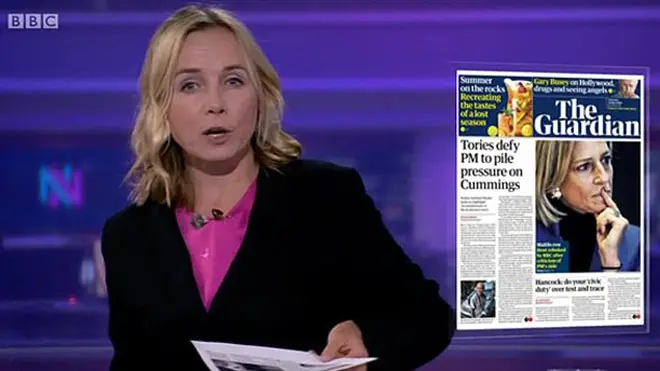
Iain Dale 7pm - 10pm
28 May 2020, 09:58

Newsnight host Emily Maitlis said she 'asked for the night off' presenting the show after the BBC ruled that her comments on Prime Minister Boris Johnson's chief adviser breached impartiality rules.
The 49-year-old broadcaster tweeted: "So grateful to my friend and excellent colleague @katierazz for stepping in this evening . She did so because I asked for the night off -knowing tonight’s prog would be in the most excellent hands"
This morning she wrote: "Been overwhelmed by all the kindness, messages - and support on here - and I’ve probably missed much of it. A big thank you from us all at #newsnight"
Been overwhelmed by all the kindness, messages - and support on here - and I’ve probably missed much of it. A big thank you from us all at #newsnight
— emily m (@maitlis) May 28, 2020
There were suggestions she had been replaced but she responded saying she had asked not to work amid the growing controversy over her introductory remarks on air.
Newsnight UK editor Katie Razzall posted: "Just for the record, Emily Maitlis has not been asked by the BBC to take tonight off - and if I thought she had been, I certainly wouldn't have agreed to present the show."

In her introduction to Tuesday's show, Maitlis said Dominic Cummings had "broken the rules" and "the country can see that, and it's shocked the Government cannot".
She said: "The longer ministers and the Prime Minister tell us he worked within (the rules), the more angry the response to this scandal is likely to be."
The "public mood" is "one of fury, contempt and anguish", she said.
Just for the record, Emily @maitlis has not been asked by the BBC to take tonight off - and if I thought she had been, I certainly wouldn’t have agreed to present the show @BBCNewsnight
— Katie Razzall (@katierazz) May 27, 2020
Following controversy over the monologue, the BBC issued a swift response.
It said staff had been "reminded of the guidelines" around impartiality, adding that the corporation must "uphold the highest standards of due impartiality in its news output".
The programme "should have done more to make clear the introduction was a summary of the questions we would examine, with all the accompanying evidence, in the rest of the programme.
"As it was, we believe the introduction we broadcast did not meet our standards of due impartiality," the BBC said.
The broadcaster's decision sparked criticism.
Good Morning Britain presenter Piers Morgan branded the BBC statement "utterly disgraceful", saying the corporation was "chucking one of its best journalists under the bus for telling the truth".
His words were echoed by journalist and former Newsnight economics editor Paul Mason, who said the decision made him "sick".
National Union of Journalists general secretary Michelle Stanistreet said: "At a time of national crisis, frank and fearless journalism that scrutinises and holds this Government to account is more necessary than ever."
She said it was "clear as day" that Mr Cummings breached lockdown rules, adding: "Journalists should be congratulated for holding policymakers to account for actions that risk a monumental breach of trust during a public health crisis."
Conservative MP Julian Knight, who chairs the Digital, Culture, Media and Sport Committee, said the broadcaster had responded rapidly to the incident.
He tweeted: "For the BBC to come out, in such terms, so quickly is really something, no circling of the wagons - issuing what is effectively a written warning."
The programme's introduction was criticised by Chris Green, Conservative MP for Bolton West, who said on Twitter that it "had a clear bias and had nothing to do with the BBC's mission to inform and educate".
He added: "We do not need Newsnight to behave as poor quality entertainment."
The Newsnight coverage centred on a trip by Mr Cummings from London to Durham during the lockdown. The Downing Street aide insists he acted "reasonably and legally".
Last year, the BBC became embroiled in an impartiality row over on-air comments made by BBC Breakfast presenter Naga Munchetty about US President Donald Trump and racism.
Munchetty was previously judged to have breached BBC editorial guidelines when she discussed remarks made by Mr Trump after he told female Democrats to "go back" to their own countries.
The ruling was later reviewed and reversed by the corporation's director-general, Lord Hall.